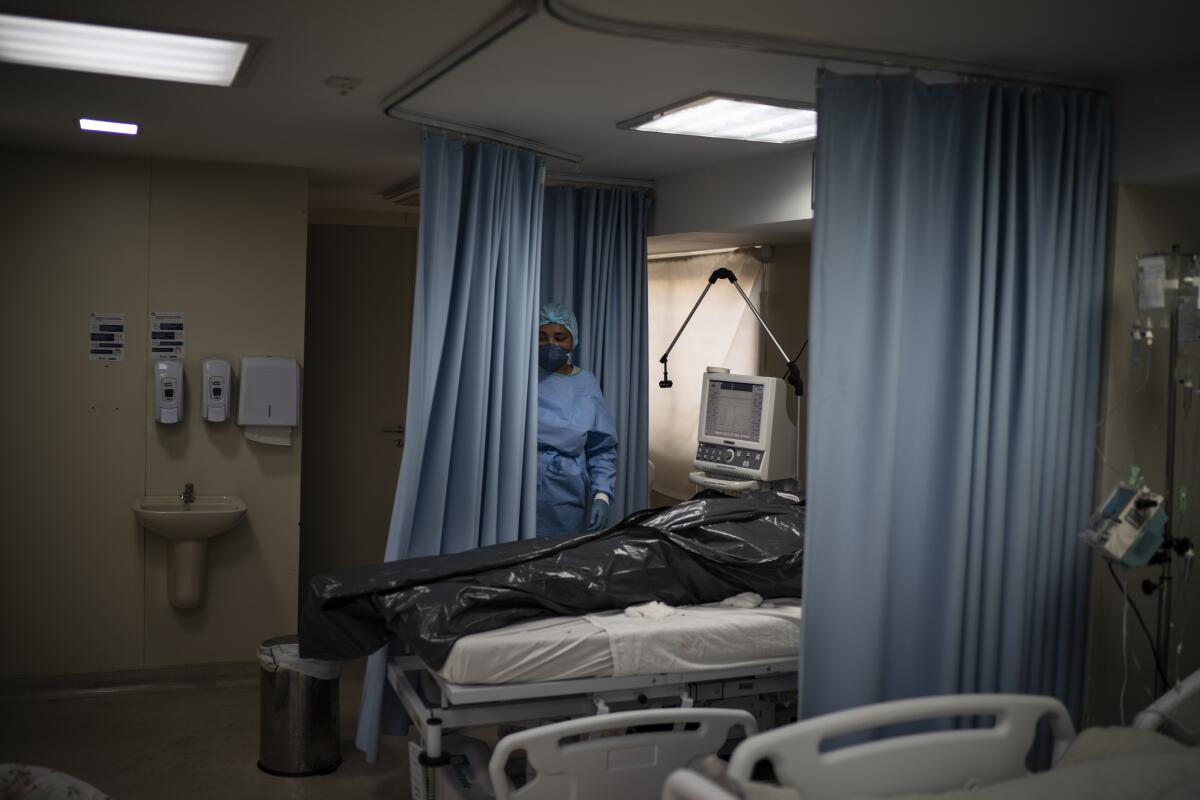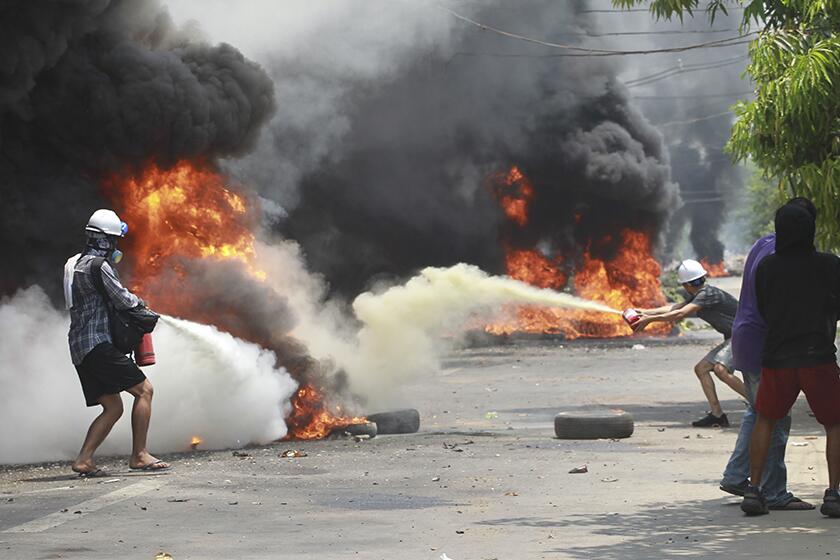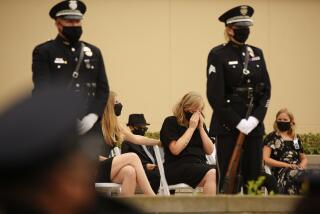As daily COVID-19 deaths soar, the worst may lie ahead for Brazil

- Share via
RIO DE JANEIRO — Brazil currently accounts for one-quarter of the entire world’s daily COVID-19 deaths, far more than any other single nation, and health experts are warning that the nation is on the verge of even greater calamity.
The nation’s seven-day average of 2,400 deaths stands to reach 3,000 within weeks, six experts told the Associated Press. That’s nearly equal to the worst level seen by the U.S., though Brazil has two-thirds its population. Spikes of daily deaths could soon hit 4,000; on Friday there were 3,650.
The United States has suffered far more COVID-19 deaths than any other country since the pandemic began — nearly 550,000. Brazil, which is No. 2, has reported more than 300,000 deaths.
Having glimpsed the abyss, there is growing recognition — not just among experts, but also many mayors and governors — that shutdowns are no longer avoidable. Restrictions on activity implemented last year were half-hearted and consistently sabotaged by President Jair Bolsonaro, who sought to stave off economic doom. He remains unconvinced of any need for a clampdown, which leaves local leaders pursuing a patchwork of measures to prevent the death toll from spiraling further.
On Armed Forces Day in Myanmar, security forces gunned down scores of unarmed protesters and passersby, according to local news reports, in the bloodiest massacre since the army seized power in a coup last month.
It may be too late, with a more contagious variant rampaging across Brazil. For the first time, new daily cases topped 100,000 on Thursday, with many more uncounted. Miguel Nicolelis, professor of neurobiology at Duke University who has advised several Brazilian governors and mayors on pandemic control, anticipates the total death toll will reach 500,000 by July and exceed that of the U.S. by year’s end.
“We have surpassed levels never imagined for a country with a public healthcare system, a history of efficient immunization campaigns and health workers who are second to none in the world,” Nicolelis said. “The next stage is the health system collapse.”
The system is already buckling, with hospital intensive care units in almost all states near or at capacity. Dr. José Antônio Curiati, a supervisor at Sao Paulo’s Hospital das Clinicas, the biggest hospital complex in Latin America, said its beds are full, but patients keep arriving. The city’s oxygen supply is tenuous, and stocks of sedatives required for intubation in ICUs will soon run out.
“Four thousand deaths a day seems to be right around the corner,” Curiati said.
On March 17 in northeastern Piaui state, nurse Polyena Silveira wept beside a COVID-19 patient who died on the floor for lack of beds at her public hospital. A photo capturing the moment went viral and served as a national wake-up call.
“When he was gone, I had two minutes to feel sorry before moving to the next patient,” Silveira, 33, told the AP. “In eight years as a nurse, I’d never felt as much pain as that night. I’m near my limit, physically and mentally.”
Brazil’s state-run science and technology institute, Fiocruz, on Tuesday called for a 14-day lockdown to reduce transmission by 40%. Natalia Pasternak, a microbiologist who presides over the Question of Science Institute, pointed to a local example of success: The midsize city of Araraquara in Sao Paulo state last month implemented a lockdown and has seen its cases and deaths recede.
Pasternak declined to estimate Brazil’s looming daily death toll but said the trend is for continued growth if nothing is done.
“We need coordinated action, and that’s probably not going to happen because the federal government has no real interest in pursuing preventative actions,” Pasternak said. “(Mayors and governors) are trying to implement preventative measures, but separately and in their own ways. This isn’t the best approach, but it’s better than nothing.”
Minas Gerais, Brazil’s second-most populous state, has closed nonessential shops. Espirito Santo state will enter lockdown Sunday. Brazil’s two biggest cities, Rio and Sao Paulo, have imposed extensive restrictions on nonessential activities. Their state authorities declared holidays to create a 10-day period of repose, which started Friday.
Restrictive measures, however, are only as strong as citizens’ compliance. And Bolsonaro continues to undermine their willingness by painting even partial shutdowns as an assault on the right to earn an honest day’s wages. He has lashed out at local leaders, particularly governors, who dare defy him.
“We need to open our eyes and understand this is no joke,” Rio Mayor Eduardo Paes said on the eve of the 10-day shutdown, stressing that no mayor wants to cause unemployment. “People are dying and, if everything continues as is, nothing is done, God only knows what could happen. No one knows this disease’s limit. No one knows how many variants could emerge.”
The next morning, hundreds of protesters marched along Rio’s Copacabana beach. Most sported green-and-yellow shirts that are a hallmark of pro-Bolsonaro rallies and many declined to wear masks. They chanted, “We want to work!” and directed vitriol at Paes.
The World Health Organization’s director, Tedros Adhanom Ghebreyesus, on Monday called for everyone in Brazil to muster a serious response — “whether it’s the government or the people.”
“It’s a concerted effort of all actors that will really reverse this upward trend. It is actually very fast and accelerating really, really fast,” he said. “Especially we’re worried about the [weekly] death rate, which doubled in just one month from 7,000 to 15,000.”
The virus’ spread has been turbocharged by the more contagious P.1 variant that has become cause for concern beyond Brazil’s borders, not just in South America. It has already been identified in the U.S., this week in New York. Dr. Anthony Fauci, the top U.S. infectious disease expert, said Wednesday that his team would be meeting with Brazilian authorities and are “quite concerned” about the situation in Brazil.
The U.S. has seen its death rate drop since late January amid a massive vaccine rollout, and its seven-day average has dipped below 1,000. By contrast, Brazil’s vaccine rollout has been strained, at best. The government bet big on a single vaccine provider, AstraZeneca, while for months rejecting offers to purchase others. Only after delivery delays from AstraZeneca jeopardized rollout did Brazil’s health ministry begin buying others — but too late for most deliveries to arrive in the first half of this year.
The nation has fully vaccinated less than 2% of its citizens, which experts widely consider an embarrassment for a country long regarded as a global model for vaccination programs.
More than 500 of the nation’s most influential economists and executives this week wrote an open letter calling for mass vaccination and decrying the situation. They said that controversy regarding economic impacts of social distancing is a false dilemma and all levels of government should be prepared to implement emergency lockdowns.
More to Read
Sign up for Essential California
The most important California stories and recommendations in your inbox every morning.
You may occasionally receive promotional content from the Los Angeles Times.











